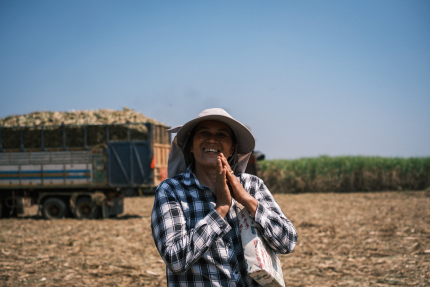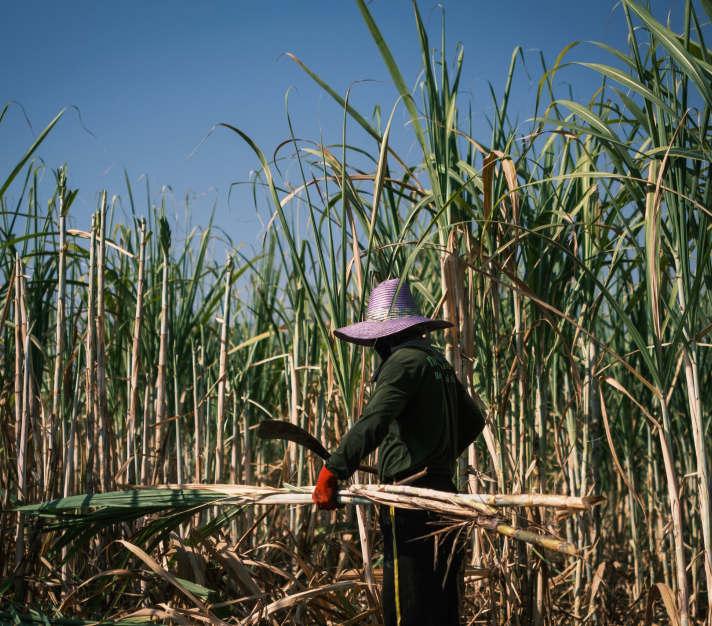Sustainability
Sustainability impact
社会に対する私たちの責任基盤である、透明性のある情報開示
製品採用実績
45ʙʀᴀɴᴅꜱ 193ɪᴛᴇᴍꜱ
これまでに45ブランド、193アイテムに私たちのBrewed Protein™ファイバーを採用いただいています。
温室効果ガス排出量(Brewed Protein™ファイバー1kgあたりのCO₂換算)を削減する緩和計画を進行中で、 2029年までにネット10kg、2035年までにネットゼロを達成する予定です。
Net Zero
2035年までに達成予定
100%
非可食原料と再生可能電力の使用
2026年までにBrewed Protein™ポリマー生産の原料として、少なくとも50トン(乾燥重量)の食用糖を非可食糖に置き換える計画を進行中です。また、2023年以降、エネルギー属性証明書を購入することで100%再生可能電力を使用しています。
Climate impact
気候変動への影響と
環境フットプリントの
最小化を目指して
Brewed Protein™ファイバーは、カシミヤのような従来の動物由来タンパ
ク質素材と比較して、より効率的で環境負荷の少ない生産プロセスを実現
しました。このデータは、事前生産段階におけるライフサイクルアセスメ
ント(LCA)の推定値であり、将来の見通しを定量化したものです。これ
らは、タイにあるSpiberのポリマープラントと日本の紡糸施設において、
再生可能電力の使用と施設のフル稼働を想定した条件に基づいています。
79%
温室効果ガス排出の削減
地表、大気、雲で特定の波長の放射を吸収または放出することで温室効果ガス排出を削減します。
82%
富栄養化の削減
富栄養化とは、湖や内湾などの閉鎖性水域で栄養分の濃度が上昇する現象を指します。
99%
土地利用の削減
土地利用を最小限に抑えることで、土地への環境負荷を軽減します。
97%
水使用量の削減
水の使用量を最小限に抑えることで、環境への影響を減らします。



Bonsucro認証とは
Bonsucroはサトウキビ業界をリードする世界的なサステナビリティプラットフォームです。サトウキビの栽培と加工に関連する環境的および社会・経済的持続可能性に関する基準を定め、これらの基準を遵守する製糖工場への認証制度を管理している団体です。当社はBonsucroのメンバーであり、タイのプラントで生産されるBrewed Protein™ポリマーはBonsucro認証を受けたサトウキビ由来の糖を採用しています。
Bonsucro認証について詳しく見る →責任ある企業行動実施宣言とは
私たちは、日本政府が作成した「責任あるサプライチェーンにおける人権尊重のためのガイドライン」と、日本繊維産業連盟が作成した「日本の繊維・アパレル産業における責任ある企業行動ガイドライン」の趣旨を理解しています。以下の宣言を行い、これらのガイドラインに基づいた取り組みを推進していきます。
繊維産業における責任ある企業行動実施宣言を読む持続可能な調達方針に関する懸念や問題の相談・通報窓口
Spiberでは、使用する材料や化学物質、関わってくださる関係者を含め、可能な限り持続可能なエコシステムを構築するよう努めています。そのため、持続可能な調達方針に関する懸念や問題について、サプライチェーン上の誰もが通報でき、その一つ一つに耳を傾けるための匿名報告システムの整備は極めて重要だと考えています。そこで新たに立ち上げたのが、匿名苦情処理システムのSpeakUpを使った、Spiber専用の相談・通報窓口です。
コンプライアンス上のご相談についてはこちら目標達成に向けた
進捗状況
Spiberは、目標達成に向けた進捗状況を共有するため、毎年の進捗報告を提供することを約束しています。

BIOCIRCULAR MATERIALS ALLIANCE
循環型への移行
循環型経済への世界的なシフトは、一層加速させなければならない喫緊の課題です。
私たちは現在、タイと米国でそれぞれサトウキビとトウモロコシを主要な原材料に 使用し、Brewed Protein™素材を生産しています。一方これらのサプライチェーンでは 持続可能な農業の実践に努めているものの、トウモロコシとサトウキビは最終的に 食用作物であるため、農業生産に伴う資源利用や環境負荷をゼロにすることは できないと認識しています。
そのため、私たちは将来的に循環型原材料へ切り替えることを目指しています。 例えば、サトウキビのバガスやトウモロコシの茎葉などの農業廃棄物に含まれる セルロースや、“Biosphere Circular”繊維でできた衣料の廃棄物を栄養分に分解し、 微生物発酵によって新たなBrewed Protein™素材を生産する際の培地原料として 再利用することなどを考えています。
そしてSpiberでは、工業用バイオマテリアルの循環型エコシステムを構築し、 効率的なリサイクルプロセスを確立することを目的としたマルチステークホルダー型の イニシアチブ「BioCircular Materials Alliance」を立ち上げ、主導しています。 このイニシアチブは、農業、繊維、その他の分野から生じる廃棄物を栄養源として再利用することで、循環型のものづくりを促進し、持続可能な未来の実現を目指します。




